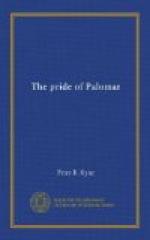They crossed at Tecarte next day and in the somnolent little border town Don Mike made sundry purchases and proceeded south on the road toward Ensenada.
Meanwhile, John Parker, his wife and daughter and Danny Leighton had motored to San Diego and taken rooms at a hotel there. Each day they attended the races at Tia Juana, and as often as they appeared there they looked long and anxiously for Don Miguel Jose Federico Noriaga Farrel. But in vain.
Three days before Thanksgiving the entries for the Thanksgiving handicap were announced, and when Danny Leighton read them in the morning paper he at once sought his employer.
“That fellow Farrel has spoiled everything,” he complained furiously. “He’s entered Panchito in the Thanksgiving Handicap at a mile and a sixteenth, for a ten thousand dollar purse. There he is!”
Parker read the list and sighed. “Well, Panchito is his horse, Danny. He has a right to enter him if he pleases—hello! Katie! Kay! Here’s news for you. Listen!”
He read aloud:
DON QUIXOTE AND SANCHO PANZA, JR.
ARRIVE AT TIA JUANA—THEY ENTER PANCHITO IN THE THANKSGIVING HANDICAP
By the Rail Bird
Considerable interest having developed among the followers of the sport of kings at Tia Juana race-track anent the entry of Panchito in the Thanksgiving Handicap, and the dope books yielding nothing, your correspondent hied him to the office of the secretary of the Lower California Jockey Club; whereupon he was regaled with the following extraordinary tale:
Two days ago a Mexican rode into Tia Juana from the south. He was riding Panchito and his outfit was the last word in Mexican magnificence. His saddle had cost him not a real less than five hundred dollars gold; his silver spurs could have been pawned in any Tia Juana loan office for twenty-five dollars and many a longing glance was cast on a magnificent bridle that would have cost any bricklayer a month’s pay. Panchito, a splendid big chestnut with two white stockings and a blazed face, was gray with sweat and alkali dust and shod like a plow horse. He wore cactus burrs in his tail and mane and had evidently traveled far.
His rider claimed to have been on the road a week, and his soiled clothing and unshaven face gave ample testimony of that fact. He was arrayed in the traditional costume of the Mexican ranchero of means and spoke nothing but Spanish, despite which handicap the racing secretary gleaned that his name was Don Miguel Jose Maria Federico Noriaga Farrelle. Following Don Miguel came Sancho Panza, Junior, a stringy Indian youth of fourteen summers, mounted on an ancient flea-bitten mule. The food and clothing of these two adventurers were carried behind them on their saddles.
An interpreter informed the secretary that Don Miguel was desirous of entering his horse, Panchito, in the Thanksgiving Handicap. The horse’s registration papers being in order, the entry was accepted, Don Quixote and Sancho Panza, Junior, were each given a badge, and a stall was assigned to Panchito. At the same time Don Quixote made application for an apprentice license for young Sancho Panza, who answers to the name of Allesandro Trujillo, when the enchiladas are ready.




